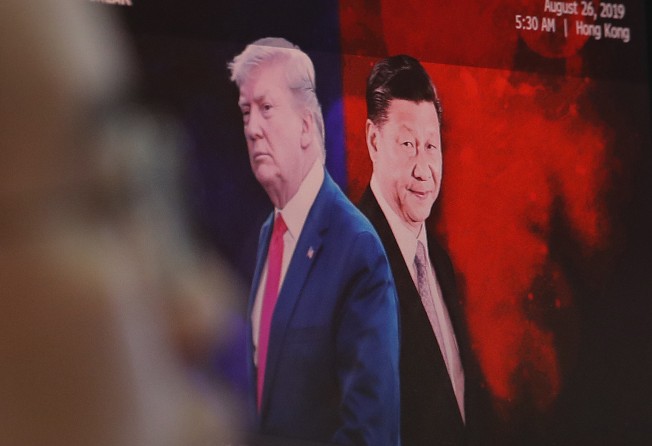US-China trade deal could come as world’s two biggest economies slow, T. Rowe Price says
- Tensions between the world’s two biggest economies are likely to linger, T. Rowe Price economist Nikolaj Schmidt says
- Growth is slowing, but the US is likely to miss a recession, Schmidt says

Slowing growth in the United States and China are likely to push the world’s two biggest economies to reach a deal on trade in the coming months, but tensions are likely to linger as there are “much deeper” issues between the two countries, according to T. Rowe Price economist Nikolaj Schmidt.
For the moment, Schmidt said that he does not expect the trade situation to escalate further between the US and China, particularly as the US election cycle moves closer and the US and global economy are showing signs of slowing.
“We are seeing indications we will see increased policy support out of China, which probably also suggests that growth in China has probably triggered – not alarm bells – but some of the red flags that [Beijing] should provide a little more support to ensure we have stable employment growth,” according to Schmidt, chief international economist in T. Rowe Price’s fixed income division. “Those are the points we need to get to before we get anything that starts to look like an agreement. On both sides, I think there is a bit of pain. I think that is a prerequisite to us getting a deal.”
The US-China trade war has raged for more than a year, with US President Donald Trump placing tariffs on about US$380 billion of Chinese imports and threatening to put tariffs on another US$160 billion of Chinese-made goods in December. China has responded with its own retaliatory tariffs as Trump tries to force Beijing to change decades of trade and industrial policy.
The two sides had their first top-level phone call since early August on Thursday and are expected to resume face-to-face negotiations next month.
BNP Paribas said on Thursday the economic slowdown in China is likely to be more severe than markets are currently anticipating, with the investment bank predicting China’s economy will grow by 5.9 per cent this year and 5.6 per cent in 2020, below Beijing’s target of 6 per cent to 6.5 per cent for growth in gross domestic product.
Against that backdrop, Siddharth Mathur, BNP’s head of emerging markets research for Asia-Pacific, described the environment as an “unusual” one where China may not be as aggressive in terms of stimulus as it has in the past, which could force emerging market economies in Asia to take more policy actions than they have in the past.
In a research report on Thursday, Bank of America Merrill Lynch said that central bankers in emerging market economies, based on central banks’ statements, are at their most “dovish” since 2009.
“Dovish central banks are supportive of EM rates and equities but cap [foreign exchange] returns, unless the [US dollar] starts to weaken,” Bank of America analysts Lars Naeckter and Stefano Pascale, said in a research note. “EM real yields remain decent.”
Schmidt, the T. Rowe Price economist, said it has been a “surprise” how tolerant Chinese authorities have been of the economic slowdown.
“There’s a clear focus on financial stability,” he said. “It is very unpleasant if you watch it from the outside. It is very comfortable if you are a manufacturing economy somewhere in Asia. This is not what you want. You would like to postpone the pain.”
Beijing officials have put a priority on “quality over quantity of growth” as the Chinese economy rebalances and reduces its reliance on credit, he said.
Schmidt said globally there has been a very protracted slowdown for more than a year, with manufacturing purchasing manufacturing indices reaching their peak in December 2017.
“The trade war is the icing on the cake, but not the real fundamental force that is driving growth into the ground,” he said.
Schmidt said Germany could be headed to a recession, but the US is likely to avoid one since there has not been a massive consumption boom or similar boom and the economy is showing signs of resilience.
“Typically in a recession you have inflation pressures. The labour market is very tight. Wages are going up. The Fed is hard pressed to keep interest rates high and that makes them slow in responding,” Schmidt said. “Today is kind of different because there isn’t the pressure and the Fed has space and leeway to cut rates and they’re doing so. We have seen a very meaningful loosening of financial conditions.”
Schmidt said that he expects the Fed to cut rates two more times – once in September and once early next year.
For fixed income investors looking for yield, Russia and Brazil are two economies that do not have negative yield.
But, investors buying local currency exposures still need to look to China, which accounts for about a quarter of the world’s GDP excluding the US. It remains a big buyer for commodity-based economies, such as Brazil.
“If China doesn’t do well, the rest of these guys are going to struggle,” Schmidt said. “It does feel like China is going to do OK. We are going through a deleveraging campaign and they have accepted a lot more slowdown than I thought they would have 18 months ago. That’s the caveat and where you need to be careful.”